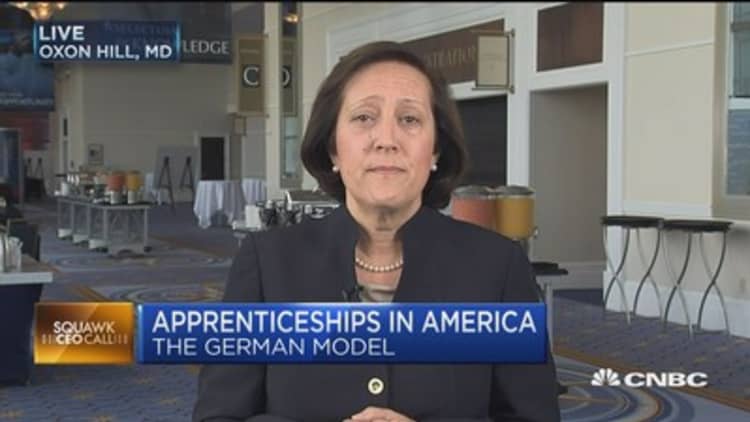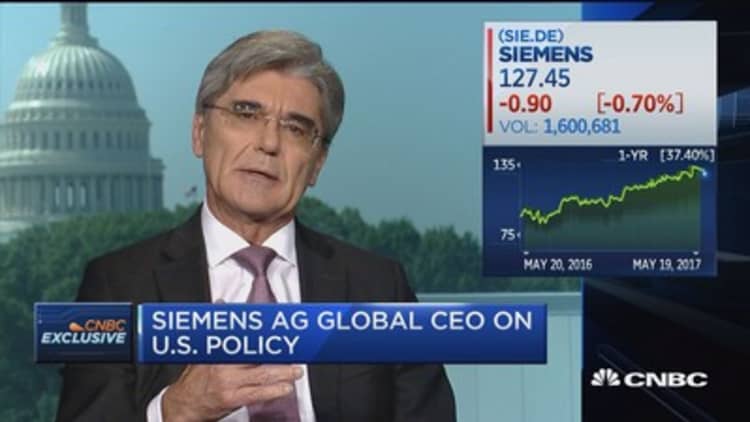One of Germany's biggest companies said Monday that it had become an unwitting pawn in a scheme to evade sanctions against Russia and break a de facto blockade of electricity to the annexed territory Crimea.
The company, Siemens, a giant engineering and electronics conglomerate based in Munich, said a Russian customer had illegally shipped two power plant turbines to Crimea instead of their intended destination in southern Russia. The diversion of the turbines flouted what Siemens said was an agreement not to violate sanctions imposed by the international community after Russia annexed the territory from Ukraine in 2014.
The incident threatens to strain relations between the countries, just days after Chancellor Angela Merkel of Germany hosted a contentious meeting of world leaders in Hamburg, attended by President Vladimir V. Putin of Russia. The Russian customer, Technopromexport, has close ties to the Kremlin.
The incident also demonstrates how energy has become a weapon in Russia's continuing struggle with Ukraine, Crimea's main source of electricity until the conflict interrupted supplies. Moscow had apparently become so desperate to solve an acute power shortage that it was willing to risk inflaming tensions with Germany.

"Russia-E.U. relations are already not in a good place, not least because there seems to be no pathway for E.U. sanctions easing at this point," said Mujtaba Rahman, managing director for Europe at Eurasia Group, a political consultancy. "In this light, this is going to be seen as something of a provocative act by Russia and will further deteriorate relations between Berlin and Moscow."
The dispute will also do nothing to encourage foreign investment or repair Russia's reputation as a place where contracts are often ignored, property is subject to arbitrary seizure and there is little legal recourse.
Siemens has been one of Russia's most reliable foreign investors. It has done business in Russia since the rule of the czars and usually avoids saying anything to offend the government.
But abandoning any pretense of diplomacy, Siemens said it would begin criminal and civil proceedings in Russia against those responsible for what it called the fraudulent export of the turbines. The unusually sharp statement on Monday followed news reports about the violations, from what the company called "reliable sources."
Siemens also said it had been lied to by its Russian customer. Technopromexport had repeatedly reassured Siemens that the turbines would not be sent to Crimea, Siemens said.
The Kremlin's spokesman, Dmitry S. Peskov, said Monday that the turbines had been made in Russia from Russian parts and were not subject to sanctions restrictions. According to Siemens, the turbines were made in Russia with a Russian partner but by contract subject to the sanctions.
"This development constitutes a clear breach of Siemens's delivery contracts, which clearly forbid our customer from making deliveries to Crimea," Siemens said.
While hurt by sanctions, Russia has been in a prolonged economic slump mostly because of low oil prices. Crimea is different. The peninsula, isolated and contested, is under a stricter regime, and electricity in particular has been politicized.
In 2015, Ukrainian nationalists blew up electrical pylons, and rolling blackouts ensued, embarrassing the Russian government by illustrating its dependence on Ukraine to keep everything, including trolley buses and hospitals, running.
Russia quickly unspooled an undersea cable, but it met only part of the region's demands. Ukraine then tried to write its claims to sovereignty into a new electrical supply contract, again rubbing in Russia's inability to power up Crimea.
The attempt to smuggle in sanctioned generators is the most aggressive Russian move to solve the electrical shortage.

Rumbling, inefficient diesel generators keep lights on. But they have already cost Kremlin-linked companies a fortune in fuel, adding to the overall cost of integrating the region under sanctions.
For multinational companies like Siemens, the thicket of restrictions in Russia can be difficult to navigate. Russian local partners have a strong incentive to win favor by skirting the rules while the parent companies have an equally strong incentive to avoid punishing fines.
And in Russia's murky legal system, compliance is never certain.
The Siemens smuggling case is among the first of Ukraine-related sanctions busting to come to light. But earlier examples abound of rule bending in Russia by local subsidiaries, which caused headaches for parent corporations.
In 2010, for example, the German carmaker Daimler settled American charges over bribes and kickbacks in several countries, including Russia, by paying a $185 million fine. The Russian subsidiary was one of two that pleaded guilty in United States District Court in Washington and in a related investigation by the Securities and Exchange Commission.
Siemens said it built the turbines in Russia with a Russian partner and sold them to Technopromexport for a power generation project in Taman, a city on a peninsula in southern Russia that is separated from Crimea by a narrow section of the Black Sea.
Technopromexport had agreed in writing not to ship the turbines to Crimea, or to export the power they generated to annexed territory, Siemens said.
The European Union has barred its companies from exporting infrastructure equipment to Crimea since Russia annexed the peninsula from Ukraine in 2014 in a move that angered the international community.
The German government is almost certain to become embroiled in the dispute because of Siemens's size and importance to the economy. The economics ministry in Berlin declined to comment except to say that German companies were responsible for adhering to sanctions imposed on Russia.
Siemens's history in Russia dates to the 1850s, when it built a telegraph network there. But recently, sales in Russia have declined because of the country's economic problems. Siemens's revenue in Russia last year was 1.2 billion euros (about $1.4 billion), half its figure for 2013.
The company is highly sensitive to accusations of wrongdoing. In 2008, it paid more than $1.6 billion in penalties to the governments of the United States and Germany after admitting it routinely bribed foreign officials to win contracts.
Siemens said it would review all its business activities in Russia to make sure there were no other violations of sanctions.

